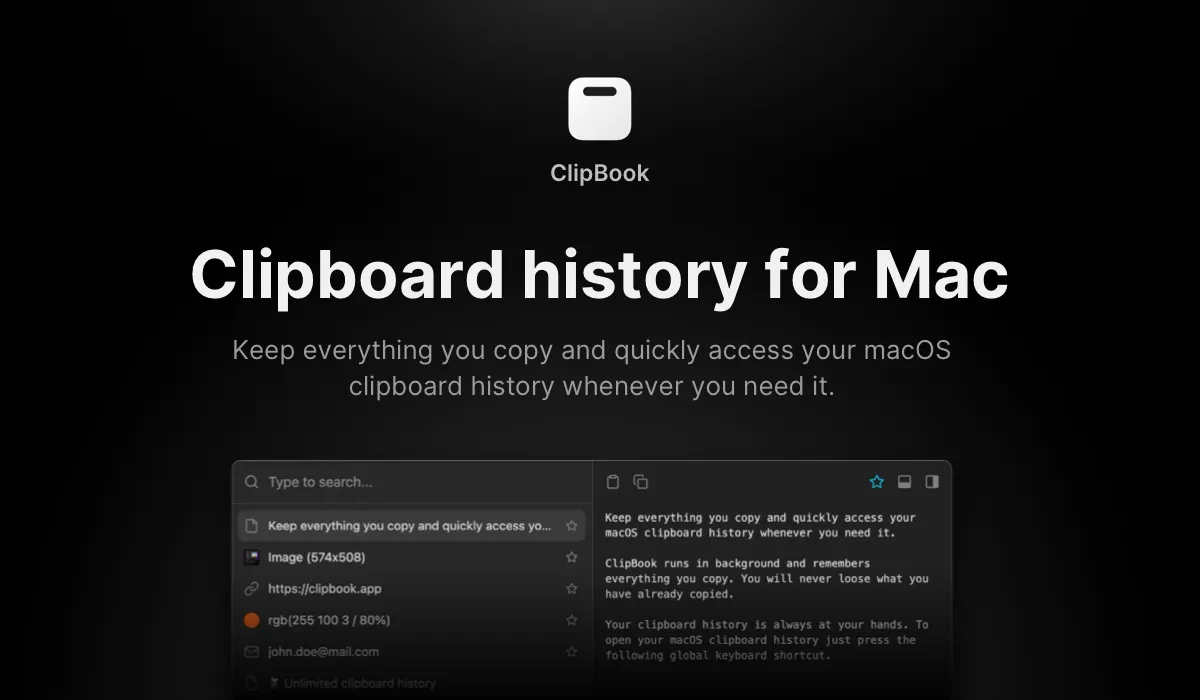I’ve been testing ClipBook on my M2 MacBook Air running macOS 15.4, and it’s become one of those utilities I didn’t know I needed until I had it. Like many Mac users who work across multiple documents, research sessions, and communication threads, I constantly find myself thinking “wait, what was that thing I copied five minutes ago?” ClipBook solves this problem elegantly.
The app runs quietly in the menu bar and remembers everything you copy—text snippets, images, files, links, colors, even emails. What sets ClipBook apart from other clipboard managers is its thoughtful implementation. When you click the menu bar icon, you get a full preview pane (toggled with ⌘P) that lets you verify the content before pasting it. This is surprisingly useful when you’re working with similar-looking URLs or code snippets where one wrong paste could cause real problems.
The keyboard-centric design means I rarely touch my mouse. Press ↵ or double-click to paste directly into the active application. Need to paste multiple items at once? Select them and ClipBook pastes them in order. The “paste without formatting” feature has saved me countless times when copying content from PDFs or websites—no more fighting with unexpected fonts and sizes.
What really earned my trust is that ClipBook is now open source. Developer Vladimir Ikryanov made the entire codebase public on GitHub, which means anyone can verify that your clipboard history (which might contain passwords, credit card numbers, personal messages) never leaves your Mac. As someone who works with remote teams across multiple time zones, I’m constantly copying sensitive information, and knowing that data stays local matters.
The app requires macOS 14.0 or newer and runs smoothly on both Apple Silicon and Intel Macs. On my M2 MacBook Air, it uses minimal resources—I’ve measured roughly 1% CPU usage and around 100MB of memory, even with months of clipboard history stored. You can configure ClipBook to clear history on quit or Mac restart if you’re privacy-conscious.
ClipBook offers a lifetime license at $9.99 for one Mac, $14.99 for two devices (home and work), or $29.99 for a family license covering five Macs. No subscriptions, free updates for life. The developer also offers a free trial so you can test it thoroughly before committing. For those who prefer to compile their own version, the source code is available under an open source license on GitHub, though purchasing a license supports ongoing development.
The interface is clean and functional rather than flashy. You can hide the menu bar icon if you prefer keyboard shortcuts, and the app integrates well with tools like Raycast and Spotlight. One nice touch: if you copy an image with text, ClipBook can extract and copy that text using ⇧⌘C, which is handy for screenshots of error messages or tweets.
I can’t speak to how well it handles extremely large clipboard histories (tens of thousands of items), but for my typical workflow involving hundreds of items over weeks, performance has been flawless. The only limitation I’ve noticed is that the UI is optimized for keyboard navigation, so if you’re strictly a mouse user, you might find the learning curve steeper than other clipboard managers.
ClipBook represents what I appreciate in Mac utilities: it solves a real problem, respects user privacy through transparency, performs reliably without bloat, and doesn’t nickel-and-dime you with subscriptions. For anyone who copies and pastes frequently—which is basically everyone—this is worth trying.
